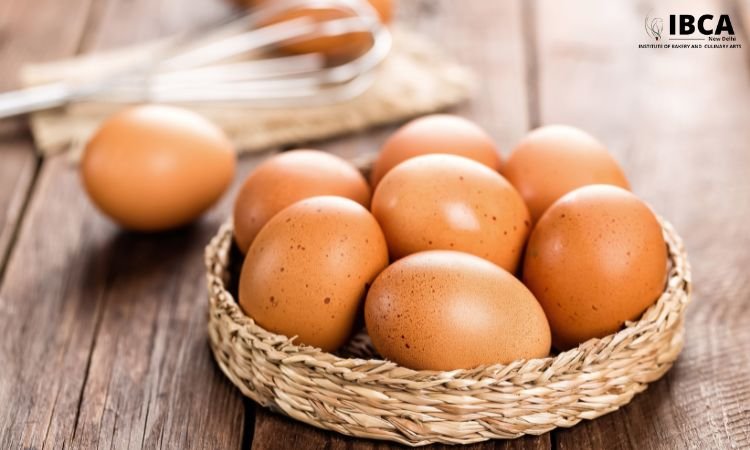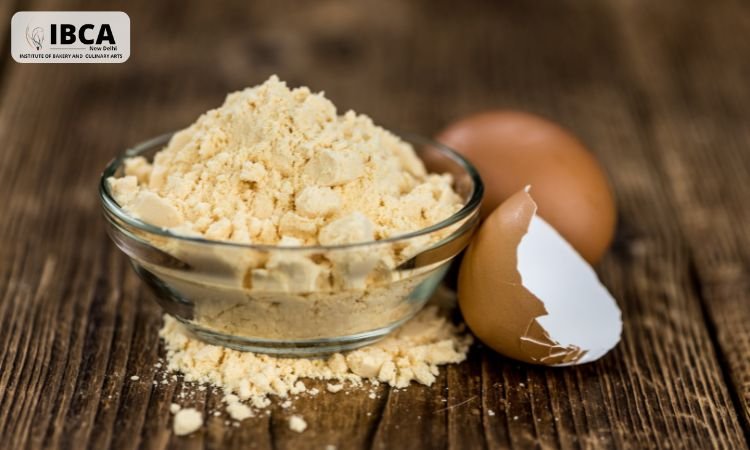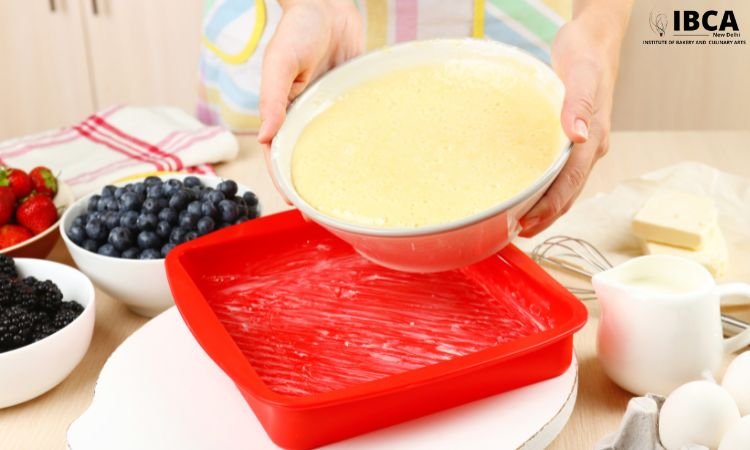A sweet and creamy cheesecake is what dreams are made of, but for amateur bakers, this classic baked delicacy might be intimidating. It’s no surprise that we usually leave the cheesecake to the professionals because there are so many things that might go wrong (cracked top! slumped-in crust! crumbly texture!). One common challenge is finding the right egg substitutes for those who prefer eggless baking. But, after perfecting the Institute of Bakery & Culinary Arts recipe, well-known pastry Chef BALENDRA SINGH knows a thing or two about cheesecake perfection.
If you’re passionate about baking, you can refine your skills with baking courses in Delhi at IBCA and learn the secrets to making flawless desserts.
Hello, Bakers!
“What can I use as egg alternatives for baking?” is by far the most popular question I get. Lately, I’ve been getting this question daily, which has made me wonder if I’m catering to this audience sufficiently. I aim to make my baking and recipes accessible to everyone, but there has been such a demand for vegetarian baking, egg substitutes, and egg-free recipes that I want to provide you with the tools and information you need to bake happily without eggs while still getting Big & Bold results.
Why Eggs Are Important in Cheesecake

Cheesecakes include eggs for a variety of reasons, the most essential being their role in providing structure to the custard and holding everything together.
Flour, sugar, vanilla, lemon peel, and cream cheese are all used in the basic recipe. When you add an egg to the mixture, it helps in smoothing and fluffing it. Eggs are used in cheesecake because they have thickening properties and hold the entire cheesy mixture together.
Egg proteins thicken as they unwind and link together in their uncooked state. When eggs cook, this process completes. The egg yolk’s emulsifiers, lipoproteins, and lecithin contribute to the cheesecake’s creamy, silky texture.
Almost every cheesecake recipe calls for either gelatin or beaten eggs, which are used as setting or thickening agents. Without eggs in the preparation, the cake will not set properly, leaving you with cream cheese pudding.
As delicious as cream cheese pudding sounds, it is more like buttercream—only suitable if kept very cold, as it becomes quite hard.
In a nutshell, eggs are required to make the Cheesecake:
- Coagulate into a single, appealing object
- Because of the yolks, it’s silky smooth and velvety.
- Because of the beaten egg whites, the cake is light and fluffy.
No-bake cheesecakes are made with the cream cheese ‘pudding’ described above, which is chilled for several hours before being placed on a cookie base.
Steps to Replace Eggs in Cheesecake Recipes
Does Cheesecake Always Have Eggs?
Baked cheesecake does, in fact, include eggs. If you look at conventional cheesecake recipes, you’ll notice that it involves eggs. However, yogurt can be used in its stead. Ricotta and cream cheese were used in traditional cheesecakes.
The custard becomes silkier when eggs, particularly the yolk, are added. As a result, the cheesecake turns creamy and delectable. When a recipe doesn’t call for an egg, it means you don’t have to bake it. The majority of cheesecake recipes include eggs. No-egg cheesecakes are also known as no-bake cheesecakes, and they’re a unique but tasty treat on their own.
Can I Use Egg Powder Instead Of Eggs?
Powdered eggs are useful for a variety of baked goods, including nut loaf of bread, handmade cakes, biscuits, and more. You can use egg powder in place of regular eggs in any recipe that asks for eggs.

Use one rounded 1/2 tbsp egg replacer powder and 2 tbsp (1/8 cup) water to replace one egg (filtered water preferred). If your recipe calls for stiff egg whites, whisk together the egg replacer powder and water until stiff (this won’t work for recipes that rely significantly on egg whites, such as meringues).
Can You Substitute Yogurt For Eggs In Cheesecake?
If you look at conventional cheesecake recipes, you’ll notice that it involves eggs. However, yogurt can be used in its stead. Ricotta and cream cheese were used in traditional cheesecakes. The custard becomes silkier when eggs, particularly the yolk, are added.
Many people enjoy using yogurt as an egg substitute in my eggless sponge cakes. Yogurt not only enhances the flavor of our recipes, but the natural fats in it also make them fluffier and richer. One egg can be replaced with 14 cups of yogurt. When using this simple egg substitute, bear in mind to use thick yogurt. If you make your own yogurt, there’s a risk it’ll be loose.
If that’s the case, straining the yogurt and separating the surplus liquid is a good idea. You can use it as-is if your homemade yogurt just has a small amount of water in it. There’s no reason to stretch it now.
Are There Any Eggs In A Cheesecake Recipe?
Baked cheesecake does, in fact, include eggs. If you look at conventional cheesecake recipes, you’ll notice that it involves eggs. However, yogurt can be used in its stead. Ricotta and cream cheese were used in traditional cheesecakes.
What To Do If You Don’t Have Enough Eggs In The Cake Mix?
Various homemade egg substitutes are worth testing; here are a few that the IBCA claims will replace one egg in recipes where the egg’s primary function is to bind ingredients together (for example in drop cookies).
- mashed half of a medium banana
- a quarter cup of applesauce
- 3 1/2 tablespoon gelatin blend (1 cup boiling water + 2 teaspoons unflavored gelatin = 3 1/2 tablespoons gelatin per egg)
- 3 tablespoons warm water and 1 tablespoon milled flaxseed (let stand for a minute before using).
What Can You Use To Replace An Egg In A Recipe?
In most recipes, 1 teaspoon (7 grams) baking soda combined with 1 tablespoon (15 grams) vinegar can be used to substitute one egg. The most popular vinegar is apple cider vinegar and white distilled vinegar. When vinegar and baking soda are combined, a chemical reaction occurs, resulting in carbon dioxide and water, which makes baked goods light and airy.
If you look at conventional cheesecake recipes, you’ll notice that it involves eggs. However, yogurt can be used in its stead. Ricotta and cream cheese were used in traditional cheesecakes. The custard becomes silkier when eggs, particularly the yolk, are added.
Baked cheesecake does, in fact, include eggs. If you look at conventional cheesecake recipes, you’ll notice that it involves eggs. However, yogurt can be used in its stead. Ricotta and cream cheese were used in traditional cheesecakes.
Can A Vegan Make A Cheesecake Without Eggs?

Many vegans who don’t eat eggs insist that eggs aren’t necessary for most recipes. By binding and gelling, as well as retaining thickness, eggs are ideal for assisting cheesecakes in preserving their semi-solid, custardy shape. Eggs, on the other hand, are fatty, and whole eggs are high in cholesterol and saturated fats.
Join the Best Baking Courses in Delhi at IBCA
If you can’t find what you’re looking for regarding “When is a Cheesecake Undercooked?”, we’re here to help. We have professional chefs on staff who can provide you with the best recommendations.
Moreover, our hobby chef programs are designed for those who enjoy the art of preparing specific dishes and want to learn how to perfect them. Weekends are quite flexible, and individual lessons are also available. These programs consist of ten classes, each focused on a specific technique that one wishes to master.
Professionals who are currently employed can also enroll in these seminars to refine their skills and bring more creativity to their work based on their prior experience.
So, if you’re looking for the best baking courses in Delhi, look no further than the IBCA (Institute of Bakery & Culinary Arts).

